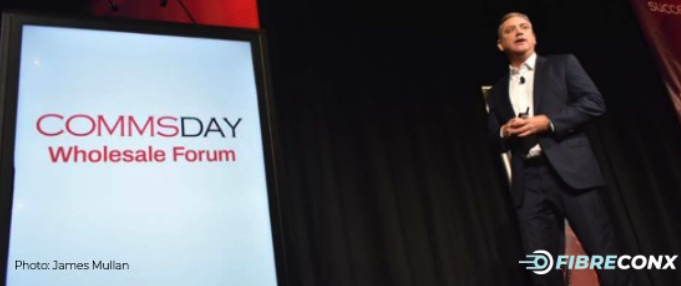Commsday Wholesale Forum
FibreconX announced the launch of Fibrexchange, a “limitless fibre” wholesale service in Sydney, Melbourne and Brisbane for $150 a month. The aggressive price point throws down the gauntlet to established fibre infrastructure providers, including NBN Co’s lucrative enterprise segment.
Speaking at the CommsDay Wholesale Forum, FibreconX CEO Mark Rafferty said the company wants to “flip wholesale on its head” and described the new service as a “game changer.”
“What we’re offering our wholesale partners is we will house your switch for you for free in a custom built exchange in the middle of the city, for you to run the fibre like you own it; compete against the current fibre operators you sell against today,” he said. “We think this is a new way to wholesale. We’re going to pre-splice an end customer dark fibre to the fibre exchange in every capital city for $150 a month, no contract. You can plug this into a one gig port, 10G port, 100G port. We don’t care. We’ll patch it, we’ll install it to your customer, you take control.”
Available from early next year, FibreXchange will be a custom built exchange in the middle of every capital city and will take advantage of the dark fibre operator’s extensive footprint in the Eastern capitals. Fibreconx has pre built, pre-tested fibres to every major corporate building in Sydney, Melbourne, Brisbane and its first phase.
“Every major corporate building will be fibred up with enough fibre for two to three fibre counts per tenant,” said Rafferty. “Every building will be pre-spliced and aggregated back to one central location. We have on average about 70-80,000 of pre-spliced pre terminated dark fibres in one location in every capital city.”
“We are not building on-order. We are not building it based upon a request. We are building this infrastructure, once,” he added.
“We want to enable wholesalers to be able to compete with physical fibre infrastructure owners,” he said. “So how are we going to do this? Look at the market; the average buy price of one gig is $500 To $1000. 10G pricing’s been launched and wholesale 10G is what, $1500-2000 wholesale but you’re competing against your $500 buy price versus your $700 sell price.”
“So we found that listening to wholesalers there hasn’t been a lot of room for them to create their own unique advantage to create their own product…more essentially being able to make a healthy margin to actually sort of service to customers,” he said.
“There hasn’t been any change to the wholesalers environment and it’s becoming harder and harder, in our opinion, for wholesalers to compete with the people you need to buy the products off,” he added.
FibreconX examined the current wholesale provisioning market and saw how it evolved to multiple aggregation nodes into the Ethernet fabric. “So you’ve got fibre being spliced at aggregation nodes, where you’ve got banks of switches. Once in you create a gigabit product. The carriers plug it into their gigabit switch port,” he said. “So we looked at it and said, Okay, if we’re going to build a serious piece of infrastructure, we need to build it once and well to be able to cater for the next phase of growth.”
CITY EXPANSION: Rafferty said the next phase will be on secondary business districts in every capital city. “Parramatta, North Sydney, Chatswood, St. Leonards and Pyrmont,” he said. “FibreconX is not going to be a small fibre operator. We are going to remain wholesale only.”
“But we want you to control it like you own it,” he said. “We’re trying to empower wholesale to take ownership of the fibre as if it was your own. You control the price you sell it for. You control the speed you put on it. You control the products you put down and you control your customer experience. You control your own switch the same way the fibre carriers of the biggest retailers you compete against today do.”
COMMUNICATIONS DAY – Simon Dux
